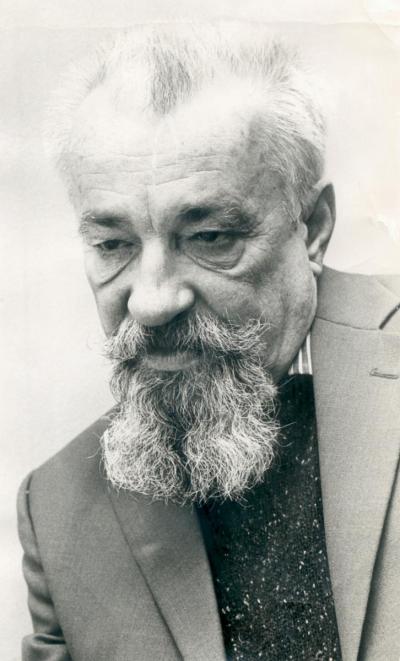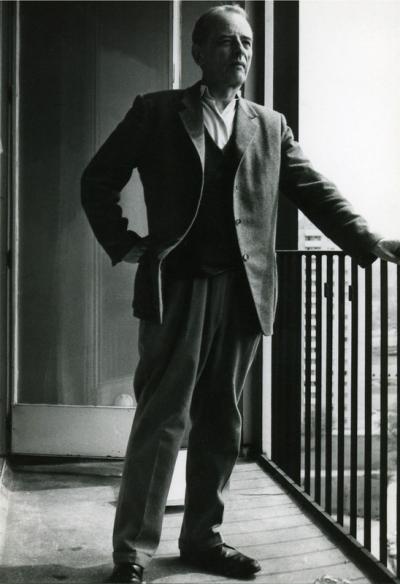Witold Wirpsza – Poet, author, translator

Witold Wirpsza’s life was full of twists and turns. The man, who would later become an author and a translator, was born in Odessa on 4 December 1918. His mother was Greek, his father a Pole who came from a noble family which was part of the Odrowąż clan. Wirpsza spent his childhood in Gdańsk and Gdynia before moving to Warsaw, where he spent his formative years. From a young age, he loved music and even gave piano concerts. Wirpsza used this talent as an opportunity to study piano at the capital’s Musikhochschule whilst studying law at the legal faculty of Warsaw University. When the Second World War broke out, he was drafted into the Polish army, exchanged student life for that of a soldier, and, after the invasion of Poland in September 1939, was involved in the battles for Oksywie, a district of Gdynia.
But this episode as a soldier did not last long because Wirpsza was captured by the Germans on 19 September 1939 and taken to the Oflag, the officers’ prisoner of war camp, in Neubrandenburg. He was then moved to officers’ camp II D Groß Born (today Borne Sulinowo in West Pomeranian Voivoidship) where he spent most of his internment. Some of the letters he exchanged with his future wife Maria Kurecka (1920-1989) during this period have survived and, as a sensitive correspondence, they document a tender and intimate exchange in which there are hardly any traces of the dark times, but in which instead there are many intellectual discussions and, despite all the terrible circumstances, life-affirming comments.[1]
After the prisoner of war camp was liberated by the Red Army, Witold Wirpsza went to Berlin on the Soviets’ side and took part in the battles for the city. When he returned to Poland, he married Maria Kurecka in 1945. A year later, their son Aleksander was born.[2] After the war, Wirpsza openly supported socialist realism and emerged as an author of literary propagandistic hymns of praise to the communist system and the power of the people. From 1947 to 1956, the author lived in Szczecin, a town which had only just returned to Poland and which, at the instigation of Leonard Borkowicz, the Voivoide at the time, was calling out to creative artists to establish themselves within the framework of the “literary settlement” to strengthen Polish culture. The authors were won over by the promise of “beautiful, former German villas with gardens”, many of which had survived the war unscathed. In Szczecin, Witold Wirpsza worked in the department of culture at the Voivodeship authorities, at a regional station for Polish radio and at the local newspaper “Głos Szczeciński” (Szczecin’s voice), which helped him become a protagonist in the young Polish culture and art scene in the city. It was during this time that he wrote his poetry volumes “Sonata” (The sonata) and “Stocznia” (The shipyard), both from 1949, “Polemiki i pieśni” (Polemics and songs, 1951), “Dziennik Kożedo” (The Geojedo diary, 1952) and “Z mojego kraju” (From my country, 1956).
In 1956, Witold Wirpsza left Szczecin. His departure also signalled the end of the social-realist era of his work. From this point on, the author sided with the opposition against the communist regime, although he was still a member of the Polish United Workers' Party (PZPR). He was a member of the editorial offices at the Warsaw weekly publications “Po prostu” (Just so) and “Nowa Kultura“ (New culture) and he worked in the German department of the state-owned publishing house Państwowy Instytut Wydawniczy (PIW). In 1967, Wirpsza was awarded a scholarship from the German Academic Exchange Service (DAAD) within the “Artists-in-Berlin programme” and travelled to West Berlin, although it initially seemed as if he intended to return to Poland. But everything changed for him when the March unrests in 1968 threw Poland into a political crisis. Wirpsza left the PVAP and started travelling again, this time on a scholarship to Vienna before moving on to Switzerland. In 1971, his historical-social essay “Polaku, kim jesteś” (Pole, who are you?) was published there, an essay which is to be understood as a reckoning with the nationalist Polish mentality. Wirpsza, as can be gleaned from Jacek Bocheński, “dedicated himself in various passages of his books to romantic fantasies, unreal forms of existence, messianism, death and martyr cult, and the mixing of patriotic and political terms with religious ones. The Polish literary language, as it originated most notably from the poets of the 19th century, fundamentally and permanently shaped the consciousness of the nation and still shapes it today, observes Wirpsza.”[3]
[1] The letters from the years 1942-1944 were published in 2015 by the Zaułek Wydawniczy Pomyłka publishing house (author’s note).
[2] Aleksander Wirpsza was an author, poet and translator of German and Russian literature. He published under the pseudonym Leszek Szaruga (author’s note).
[3] Jacek Bocheński, Witold Wirpsza i polskie mity. Polaku, kim jesteś?, [in:) Gazeta Wyborcza of 28/6/2010, online: https://wyborcza.pl/1,76842,8065232,Witold_Wirpsza_i_polskie_mity__Polaku__kim_jestes_.html (last accessed on 18/2/2021).
The book “Polaku, kim jesteś?” made Witold Wirpsza famous, but it also caused him a lot of problems. The critical confrontation with Poland and its people displeased the communist rulers so much that the censor imposed a publishing ban on him. As a consequence, the author settled permanently in West Berlin. Wirpsza fared well in Germany. There he was a respected authority on Poland and in demand as a commentator on Polish matters. His renown was also fuelled by the tumultuous time in Poland's history, with its strikes, demonstrations and the birth of the freedom movement. All of this aroused great interest in Poland within Germany, whilst Wirpsza, who was able to throw some light on the social background, became a mediator between Germany and Poland by helping to gradually eradicate the old clichés about the country on the Vistula. The special understanding for Poland that emerged in the Federal Republic in the 1970s was mainly due to Witold Wirpsza. The author also cultivated a lively intellectual exchange with his German peers and was in correspondence with Günter Grass, Karl Dedecius and Heinrich Böll, to name but a few. In conflicts, he acted as a mediator between German and Polish intellectuals. But life as an emigrant and the publishing ban in his homeland also had a negative impact on him. His absence meant that he disappeared from the consciousness of Polish readers and was forgotten as an author by many. His poems were only published in Poland “second time round” (drugi obieg) and two of his important volumes, “Cząstkowa próba o człowieku“ (Substudy on humans) and “Spis ludności” (The census), only came to light 20 years after his death.[4] The novel “Sama niewinność” (Innocence itself) from 1975, whose manuscript was discovered in the library at the Polish Museum in Rapperswil in Switzerland, had to wait until 2017 for its book launch.
Translations of German literature into Polish, which he had worked on with his wife Maria Kurecka, played an important role in Witold Wirpsza’s creative work. And from it arose a team of two exceptional translators. Leszek Szaruga remembers his parents: “Both of them were multilingual. In front of us children they argued in German, but when my sisters and I started to ‘get’ what it was about, they switched to French. They both spoke English and Russian as well (father since childhood- his mother, a Greek from Odessa, never managed to learn Polish, so Russian was the common language at home), and mother had learnt Italian and Danish. It was significant that both were very proficient in Latin thanks to their schooling. Ultimately, both of them enjoyed translating – mother more as an end in itself, whilst father saw it more as a workshop exercise that allowed him to test his Polish vocabulary: with a few exceptions, they translated texts that were important to them, even though, of course, they also worked for the money every now and then.”[5] Some of the works the couple translated included “Doctor Faustus” by Thomas Mann, “The Death of Vergil” by Hermann Broch, and Friedrichs Schiller’s “Mary Stuart”. Undoubtedly, Wirpsza’s musical streak had an influence on the texts that were selected and led to he and his wife translating the biography “Johann Sebastian Bach” by Albert Schweitzer and the Mozart novel “Wolfgang Amadé” by Valerian Tornius. In 1967, the couple’s joint work was awarded the Johann Heinrich Voß Prize for translations. Wirpsza also translated works of younger, little known Polish authors and was thus responsible for helping them gain more widespread attention in the Federal Republic. He also regularly discussed new Polish releases in the German press.
Wirpsza also gave lectures in poetiks at the Technical University in Berlin. On top of this, he and his wife worked with the emigrant press, such as “Kultura” in Paris and the Berlin magazine “Archipelag” as well. Witold Wirpsza died on 16 September 1985. He was buried at the Berlin Ruhleben cemetery. His remains were later moved to Warsaw. Since 2005, the Mikołowski Institute in Mikołów (Instytut Mikołowski) has gradually published the works of Witold Wirpsza which has reignited interest in the individual and in the works of the poet and author who has been somewhat forgotten. By 2018, 18 of his texts had been published, with some of them published for the first time. Literary critics are also slowly rediscovering the author Witold Wirpsza, with many ranking Wirpsza among the greatest talents in 20th century Polish literature, along with Tadeusz Różewicz, Miron Białoszewski and Zbigniew Herbert, because of his original style.
Monika Stefanek, February 2021
[4] Witold Wirpsza, article on the website Culture.pl, online: https://culture.pl/pl/tworca/witold-wirpsza (last accessed on 18/2/2021).
[5] Cited from: Leszek Żuliński, Wojna i miłość, online: https://latarnia-morska.eu/en/port-literacki/1978-listy-z-oflagu-witolda-wirpszy (last accessed on 18/2/2021).


